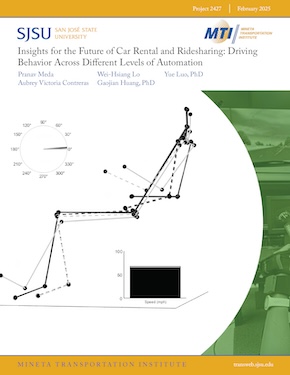- 408-924-7560
- mineta-institute@sjsu.edu
- Donate
Insights for the Future of Car Rental and Ridesharing: Driving Behavior Across Different Levels of Automation
Autonomous vehicles are reshaping the car rental and ridesharing industries, potentially leading to a unified model of on-demand transportation suitable for both uncommon (e.g., business trips) and daily commuting. An exploratory study of human behavior towards autonomous vehicles can uncover the challenges and opportunities inherent in different levels of vehicle automation. This study aims to (a) identify behavioral differences in drivers operating vehicles at various levels of automation and (b) explore how these behaviors vary with different assistance feature styles, specifically between risky and conservative modes. Human-subject experiments were conducted among twelve participants (aged 21 to 29, including four women) to complete simulated driving trials under different levels of automation (Levels 0, 3, and 5), assistance features (risky and conservative modes), and driving activities (lane keeping and lane changing). Measures of driving performance, body posture, and eye movement were recorded during each trial. The data implied that: (1) driving performance: drivers exhibited stable speed and steering control at Levels 0 and 5, while speed decreased and steering variability increased obviously at Level 3; (2) driving posture: a tense posture was noted at Level 0, with potential posture preparation needed for takeover actions at Level 3; (3) eye movement: active scanning and continuous control were maintained at Level 0, with notable shifts in attention at Levels 3 and 5. Further research could focus on conducting on-road tests, using equipment designed for on-road tests and broadening the demographic range of participants.
Pranav Meda
Pranav Meda is a second-year student in San José State University’s Human Factors & Ergonomics MS program, concentrating in User Experience. He received his B.A. from University of California, Los Angeles in Psychology and Cognitive Science in 2017 and is a lead graduate researcher for the Biomechanics and Ergonomics in Environment-Persons Interaction and Collaboration Laboratory (BE-EPIC) Lab. His research focuses on digital design usability, substance abuse /public health and human-device interaction. This involves projects ranging from the usability of an e-commerce mobile application to human driving behavior in autonomous vehicular systems. This spectrum of versatility represents Pranav’s expertise in qualitative and UX design work to experimental research quantified with physiological data obtained with the assistance of devices such as motion capture systems, heart rate monitors, and eye-tracking systems, and through subjective measures such as questionnaires. Pranav has authored two papers: one about substance use disorders and the other about the application of upper limb exoskeletons for use in pediatric rehabilitation.
Aubrey Victoria Contreras
Aubrey Victoria Contreras is a graduate student majoring in M.S. Human Factor Ergonomics at San José State University. She received her B.A. in Psychology from University of California, Davis in 2017. She has 7+ years of public service experience working with the Department of Transportation in a Project and Program Management capacity. Her research interests include automotive and driver behavior, patient safety and healthcare, and consumer applications to better improve the usability, accessibility, safety and enjoyment of these products and environments.
Wei-Hsiang Lo
Wei-Hsiang Lo is a graduate student majoring in M.S. Human Factors Ergonomics at San José State University. He received his B.A. in Industrial Design from Shih Chien University in 2021. He currently works as a research assistant and lab manager in the Behavior, Accessibility, and Technology (BAT) Lab. He is passionate about developing inclusive solutions and assistive tools for diverse user groups, such as older adults and individuals with hearing impairments. His research focuses on creating human-machine interfaces (HMIs) that connect human capabilities with automation and AI systems to enhance human performance and promote inclusivity. His work aims to ensure that all users can safely access and benefit from technology.
Gaojian Huang, PhD
Dr. Gaojian Huang is an Assistant Professor in the Department of Industrial and Systems Engineering at San José State University and the director of the Behavior, Accessibility, and Technology (BAT) Lab. He specializes in human-centered automation systems, human-machine interfaces, human-AI collaboration, and inclusive design. His research focuses on the design of adaptive human-automation/AI systems that enhance human decision-making and performance. He develops and evaluates technologies to improve accessibility for diverse user populations, including older adults and individuals with disabilities, by creating adaptive systems tailored to user capabilities and context, such as multimodal interfaces integrating augmented reality and haptic feedback. His research is supported by grants from the National Science Foundation, the U.S. Department of Transportation, the National Institutes of Health (NIH), and industry, and is disseminated through more than 50 research publications.
Yue Luo, PhD
Dr. Yue Luo is an Assistant Professor from the Department of Industrial and Systems Engineering at San José State University. She is the lab director for the Biomechanics, and Ergonomics in Environment-Persons Interaction and Collaboration Laboratory (BE-EPIC) Lab. Her research focuses on human-centered evaluation in multi-agent systems. This includes assessment of physical and physiological interactions between non-human agents (e.g., robots and autonomous vehicles) and individuals from diverse demographics (e.g., older adults). These interactions are quantified and analyzed by objective data collected via wearable technologies (e.g., motion capture systems, electromyography, and eye-tracking systems) and through subjective measures, such as questionnaires. Dr. Luo has authored more than thirty papers on human-robot interaction, digital human modeling, motor behavior and control, and inclusive design. Part of her research is supported by grants from the National Science Foundation and the U.S. Department of Transportation.
-
Contact Us
San José State University One Washington Square, San Jose, CA 95192 Phone: 408-924-7560 Email: mineta-institute@sjsu.edu






